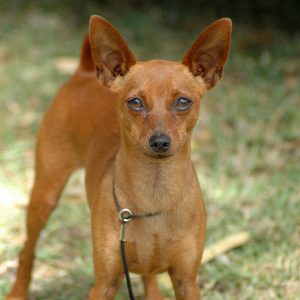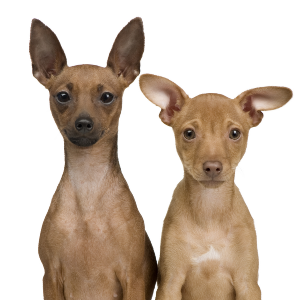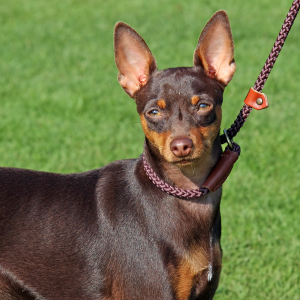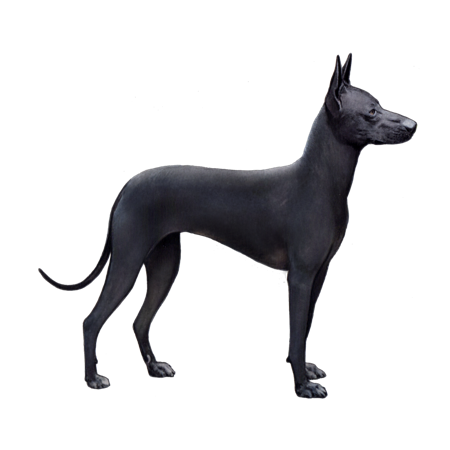
Miniature Pinscher
Miniature Pinschers are intelligent, curious, and energetic. Though very loyal to their families, they're often suspicious of strangers—qualities that make them great watchdogs. An eager-to-please, fast-learner, the Miniature Pinscher is an excellent pet.
Interested in discovering if your dog is a Miniature Pinscher?
Check out Wisdom Panel's DNA tests.

Miniature Pinscher Traits
General Appearance
The Miniature Pinscher has a smooth, shiny coat and a sturdy, wedge-shaped build.
Coat and Coloring
Min Pins come in solid colors with shades of red or stag red (i.e., red with some shading from black hairs). They can also be chocolate or black with red markings.
Distinctive Physical Traits
The Miniature Pinscher has a solid build, elegantly curved neck, tapered head, and erect ears. However, the most striking feature is a characteristic hackney-like gait, which resembles a high-stepping horse.
Miniature Pinscher Temperament
The Miniature Pinscher is a high-spirited, intelligent, alert, and proud breed. These pups are eager to please, and quite the entertainers once they get your attention.
Miniature Pinschers are generally good with children. However, they need to be monitored when around very young kids for the safety of all involved. It's also necessary to keep an eye on these dogs to prevent them from getting into trouble. An unsupervised Min Pin may grab items from cupboards and tabletops or escape from the yard.
Because of their small size, Miniature Pinschers may be intimidated by other dogs. This reaction can trigger defensive barking or confrontations. Min Pins are also inclined to bark in general, thanks to their hunting backgrounds.
If properly trained, Miniature Pinschers make delightful therapy dogs that provide comfort and love with no strings attached.


Miniature Pinscher History
Breeders developed the Miniature Pinscher in Germany to hunt rats in stables. The breed is not a miniature version of the Doberman Pinscher, as commonly thought. In fact, the Miniature Pinscher is much older than the Doberman, though the two breeds share some common ancestors.
Miniature Pinschers were very popular in Germany and Scandinavia before their widespread introduction to other countries in the early 1900s.
The breed came to the United States in 1919 and received recognition from the American Kennel Club in 1929.
Fans of these dogs affectionately refer to them as "Min Pins"—a nickname that's almost as charming as the Miniature Pinscher itself.
Miniature Pinscher Care
Nutrition
Miniature Pinschers require a high-quality, age-appropriate dog food. It can be commercially manufactured or homemade (under a veterinarian's supervision and approval).
It's essential to carefully monitor the amount of food you feed your Miniature Pinscher and reduce portions if your pup gains weight. Also, remember that giving too many treats in addition to regular meals can contribute to obesity.
Grooming
The short, hard coat of the Miniature Pinscher is a breeze to maintain. Sweeping the coat with a soft brush or a hound glove will keep it in tip-top condition.
Exercise
Miniature Pinschers are active and athletic dogs that enjoy a variety of activities. Walks around the block, play sessions, and games are all great ways to meet their physical and mental needs.
Though Min Pins enjoy their couch potato time, they're just as eager to race to the back yard to chase a ball. They also do well in canine sports—such as agility and obedience competitions—and learn tricks quickly.
Training
Though they often bond with their families, Miniature Pinschers may be wary of other people and dogs. Early socialization and puppy training classes are a core part of raising a courteous and well-rounded dog.
Min Pins are sometimes a bit stubborn. You can reduce this tendency by incorporating motivational tools, such as tasty treats and favorite toys, into a reward-based training program.

Miniature Pinscher Genetic Health Conditions
-
Chondrodystrophy (CDDY) and Intervertebral Disc Disease (IVDD) Risk
Chondrodystrophy (CDDY) is a skeletal disorder characterized by shortened limbs and abnormal early degeneration of the spinal discs, or intervertebral disc disease (IVDD), which predisposes to disc herniation.
-
Mucopolysaccharidosis VI (Discovered in the Miniature Pinscher)
Mucopolysaccharidosis (MPS) VI is a severe metabolic disorder that can lead to stunted growth and progressive skeletal deformities. The associated genetic variant has been identified in the Miniature Pinscher.
Knowing if your Miniature Pinscher is a carrier or at-risk for these conditions can help you and your veterinarian plan for your pup’s lifelong care. With Wisdom Panel™ Premium, you can get results for over 200 genetic health tests.
Breed Group
Terrier
The Terrier Group ancestors were bred to hunt and kill vermin. They are often characterized as feisty and energetic dogs whose sizes range from fairly small to much larger.





















































